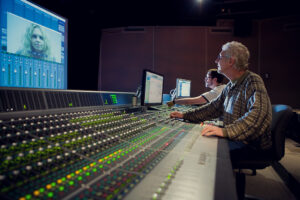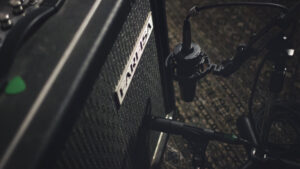In today’s article, we’re learning how to collect performance royalties. If you’re an artist, songwriter and/or publisher, you’ll want to keep reading.
Disclaimer: The topic of performance royalties is relatively difficult to navigate. That being said, you’ll want to consult multiple sources as you, the reader of this article, are fundamentally responsible for your music career. Decibel Peak Academy simply offers the knowledge that assisted me in my personal musical endeavours. Okay, let’s get started!
If you want to learn how to collect performance royalties from your music, you’ll need to understand how the music industry works. Institutions referred to as “Performance Rights Organizations” (or “PROs” for short) are responsible for collecting and administering performance royalties on your behalf. It would be nearly impossible for any individual to accomplish that on their own. However, you’ll also be learning that the music industry is still vastly “uncharted” which means that millions of dollars of royalties have been “lost at sea”. That won’t be an issue though because you’ll be reading about all the resources that will allow you to MAXIMIZE your royalties. Here we go!
- What is the difference between mechanical royalties and performance royalties?
- How are performance royalties paid?
- Performance royalties vs publishing royalties
- Do publishers collect performance royalties?
- Who collects royalties from streaming services?
- Does SOCAN collect performance royalties?
- Does BMI collect performance royalties?
- Does SongTrust collect performance royalties?
- How to collect performance royalties using your PRO, SoundExchange and SongTrust
What is the difference between mechanical royalties and performance royalties?
Did you know that there are different types of royalties? It’s true, but we’ll only be covering another of these royalty types today called “mechanical” royalties. It seems like the term has become obsolete since the rise of the streaming service, but it ISN’T obsolete!
Mechanical royalties are still collected, but not by your PRO (read this article for more info).
Here’s the simplest way of distinguishing mechanical vs performance royalties:
- Mechanical Royalties: The music is broadcasted at random (not chosen)
- Performance Royalties: The broadcasted music is selected (is chosen)
Here are some examples of mechanical royalties (non-interactive):
- Royalties generated from the distribution of CDs
- Royalties generated from internet radio (ex.: Pandora)
- Royalties generated from video games (not always)
Here are some examples of performance royalties (interactive):
- Royalties generated from music played on streaming services
- Royalties generated from music played on television (ad, show, etc…)
- Royalties generated from music on YouTube and other UGC platforms
Can you see the difference?
It’s traditionally been record labels who have been responsible for distributing these. That’s because they were the ones producing the CDs, tapes, vinyls, etc…
Nowadays, streaming services are the ones who mostly collect mechanical royalties. However, you’ll want to register your tracks with SoundExchange in addition to your PRO to maximize your chances of collecting everything.
Of course, we’ll be covering PROs in the coming sections.
For more information on mechanical royalties and SoundExchange, you can consult this article.
How are performance royalties paid?
As mentioned in the introduction, performance royalties are collected by Performance Rights Organizations (PROs) and administered on your behalf. It’s now possible to receive your royalties by direct deposit, straight to your bank account!
In the past, it was delivered by mail (hence the term; “mailbox money”).
Here are some of the most notable PROs:
It’s also understood that royalties are paid out quarterly (every 3 months). That may sound like an inconvenience to some, but these payouts can become quite substantial. Of course, that depends on how much music you have out there, working for you.
It’s also important to note that performance royalties are taxable.
That being said, performance royalties collected outside of your country can usually be deducted from your income taxes as “foreign tax credits”. However, that only applies to royalties that have already had deductions.
Just keep in mind that SOMEBODY is going to tax your royalties.
You can consult with your local accountant and/or tax advisor for more information!
Just rest assured that your royalties are being collected around the world. You just need to make sure that you’re registered with ONE performance rights organization (no more). I personally work with SOCAN and have BMI as my representative.
If you have questions about SOCAN, I can probably help (leave me a comment).
Performance royalties vs publishing royalties
Performance royalties often get confused with publishing royalties. The problem is that we’re really talking about the same thing. Publishers collect 50% of the performance royalties and the other 50% goes to the writer (also known as the songwriter).
Do publishers collect performance royalties?
As we just learned, publishers (which can also be you, the artist) collected 50% of the performance royalties. If you’re publishing under your own name/label, then you get both halves!
It’s not even necessary to have your own publishing company.
However, you may want to consider creating one in the future (when your income is substantial enough). It’s not required because publishing royalties will automatically be directed to the writer/composer if no publishing company has been named.
Either way, most artists are self-published nowadays.
If you’re interested in learning how to publish your own music, check out this article.
Who collects royalties from streaming services?
It’s partly collected by the streaming services and by your performing rights organization (PRO). The reason that streaming services can’t collect all the royalties is simple… They don’t collect money from the restaurants, bars, hotels, elevators, shopping malls, etc… That may or may not perform your music on their premises.
It’s your PRO who is responsible for collecting the rest.
These establishments are required to pay recurring licenses to government bodies in order to legally broadcast music to their customers in public. To be honest though, I’m not even sure if this applies to streaming services at the moment. They’re still relatively new to the scene.
It would certainly apply to radio/TV stations though.
Besides registering with your PRO, I also recommend working with SoundExchange. It’ll maximize your chances of collecting 100% of the royalties owed to you.
Does SOCAN collect performance royalties?
As we discussed earlier, SOCAN does collect performance royalties. It’s the PRO for Canadians so I don’t recommend signing up unless you’re a local. I personally register my music with them, but have BMI as my US-representative.
Your local PRO should work the same.
It’s also important to keep in mind that most PROs like SOCAN are free of charge.
Does BMI collect performance royalties?
BMI collects royalties on behalf of rights owners in the United States, but can also do the same for international writers. If you’re not sure who to register your music, you can’t go wrong with BMI (regardless of where you live).
Just remember that you can only register your music with one PRO.
Does SongTrust collect performance royalties?
SongTrust DOESN’T collect all your performance royalties. However, it can collect royalties generated through YouTube’s ContendID and it also collects foreign mechanical royalties which AREN’T collected by your PRO.
That being said, you should most likely register with SongTrust in addition to your PRO and SoundExchange. It sounds like a lot, I know…
But you’ll be covering all your bases this way!
How to collect performance royalties using your PRO, SoundExchange and SongTrust
If that title doesn’t sum everything up, I don’t know what will!
Maybe this list?
- Performing Rights Organization (SOCAN, BMI, etc…)
- SoundExchange (“non-interactive” platforms)
- SongTrust (ContentID and foreign mechanical royalties)
That’s what you need to do to collect ALL your performance royalties.
You’ll also want to check this article out for more information on collecting ALL your mechanical royalties. That’s important too!
I hope that this article has simplified the process of collecting performance royalties for you. If you have any questions and/or concerns, feel free to leave me a comment. Always remember to consult multiple sources and that I’m not qualified to make decisions in your place. Decibel Peak Academy simply provides guidance and knowledge.
If you’d like to work with me 1-on-1, you can schedule that session here.
Sources
https://www.manatt.com/Manatt/media/Media/PDF/US-Streaming-Royalties-Explained.pdf
https://www.ascap.com/help/royalties-and-payment/intltaxreporting








